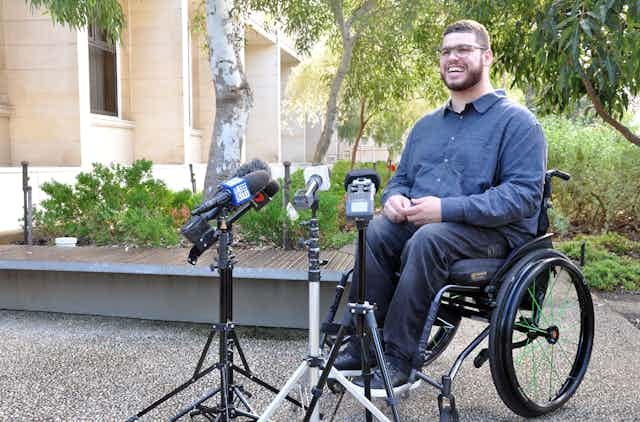The Royal Commission into Violence, Abuse, Neglect and Exploitation of People with Disability has shared its final report. In this series, we unpack what the commission’s 222 recommendations could mean for a more inclusive Australia.
The federal government last week released the report of the Royal Commission into Violence, Abuse, Neglect and Exploitation of People with Disability, which painted a confronting picture and recorded the calls of disabled people “for a more inclusive Australia”.
The commission made more than 220 recommendations, and was conducted at a cost to the taxpayer of $600 million. But commissioners split on the key issues of special schools and group housing for people with disabilities, causing immediate controversy.
In this podcast, the Greens spokesman on disability, Jordon Steele-John, who campaigned for the royal commission, joins The Conversation to discuss the report, and also to canvass the NDIS, which is under review in another inquiry.
Steele-John feels “immense pride” in the disabled community for their contribution to the royal commission report, and sees it as a milestone:
This is the work of so many people who have themselves experienced violence, abuse, exploitation and neglect, who campaigned for decades to see this investigation be undertaken […] It’s a milestone for the Australian disability community who have come together in the aftermath of this report to say ‘now is the time to end segregation and to end ableism in Australian government policy’.
Steele-John opposes separating disabled people into special schools and group homes, so he backs those commissioners who want a phase-out. But he believes the proposed timelines are unnacceptably long.
They’ve suggested that we wait until 2050. In segregated education, for instance, that would mean that a disabled child born today would be likely to see their child educated in a segregated setting. That’s not acceptable.
They’ve also recommended that we take a decade to reach the point at which a disabled person is paid the same as a non-disabled person in the workplace. That’s unacceptable, but I think it is really important that we really grapple with and acknowledge the reality of the damage that segregation does to people. It leads to loneliness and isolation, and it exposes them to the violence, abuse and neglect that the recommendations in the report found.
While Steele-John has seen an improvement in the NDIS since Labor won the election, he has criticisms.
My quite critical observation of the government is that they have, I think, failed to push back on and have in many ways bought into a conversation about the NDIS, which is very one sided, focusing on its financial implications on the overall federal budget and minimising the good that it does in people’s lives; while point blank refusing to commission new research or investigations into the positive economic impact of a scheme who, the last time anybody checked, [the investment] actually returned $2.25 for every dollar that was invested in it.
So if you combine that with the fact that the minister’s made a number of comments and their colleagues have made a number of comments about people with psychosocial disabilities and other disabilities and there being too many of them on the scheme, I think that’s really concerning to me and really concerned to the disability community more broadly.

